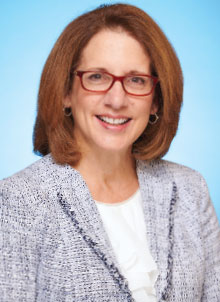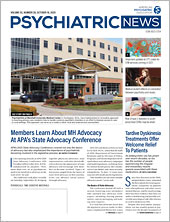Legislation to expand nonphysician scope of practice can arise quickly at the state level and without warning. In Maine, a bill to allow physician assistants to practice independently was unexpectedly passed by the legislature and signed by the governor at the onset of the COVID-19 pandemic. In Connecticut, it took just one constituent’s request for a lawmaker to introduce a bill to give psychologists prescribing privileges.
Yet district branches (DBs) across the country have successfully confronted these efforts, with APA as their partner. APA’s Department of Government Relations is prepared to help states tackle such bills, which include expanding the scope of practice for nurse practitioners and physician assistants and granting prescriptive authority to psychologists.
“The issue is patient safety and how to best care for our patients,” said Katherine G. Kennedy, M.D., chair of APA’s Council on Advocacy and Government Relations (CAGR). Kennedy is an assistant clinical professor of psychiatry at Yale and co-editor of A Psychiatrist’s Guide to Advocacy from APA Publishing. “As psychiatrists, we know that the stigma against people with mental illnesses, including substance use disorders, is real. These patients deserve to have quality mental health care.”
Debra Koss, M.D., is president of the New Jersey Psychiatric Association and chair of CAGR’s Subcommittee on District Branch Advocacy. She has worked to battle scope-of-practice legislation in her own state for almost a decade and assisted colleagues in other states on similar legislation.
When legislation to give psychologists prescribing privileges was first introduced in New Jersey, Koss said her DB worked closely with DGR staff to create talking points, develop an elevator speech for brief interactions with legislators, and focus on patient safety.
In conversations with lawmakers, Koss and her colleagues described the education and training physicians receive and the ways in which that training is necessary to accurately diagnose people with mental illness and safely treat those patients, she said. Koss is a clinical assistant professor in the Department of Psychiatry at Rutgers-Robert Wood Johnson Medical School.
“What we confirmed in the process was something we suspected all along,” Koss continued. “Most elected officials, and even a lot of stakeholders who had previously worked with us, truly didn’t understand the distinction between psychologists and psychiatrists. So we began to incorporate messaging on our education and expertise into all of our advocacy work.”
In fact, Koss and her fellow advocates focused on this message every time they interacted with legislators. “We saw it as a priority,” she said. The key was developing a proactive rather than reactive advocacy strategy. The DB suggested solutions to the workforce shortage, for example, by educating lawmakers about the Collaborative Care Model, the importance of increasing residency training slots, and loan forgiveness programs. “We were eventually able to redirect our resources to be able to promote evidence-based solutions to the workforce shortage,” Koss said.
For many similar legislative battles across the country, education is key to successful advocacy. That was the case in 2019, when Kennedy and her colleagues successfully confronted a psychologist prescribing bill in Connecticut.
Many people do not understand that psychiatrists are medical doctors, Kennedy explained, and that psychiatrists receive thousands of hours of clinical training. The advocates provided lawmakers with a graph provided by Erin Berry Philp, APA’s director of state government relations, which demonstrated how many hours of training that psychiatrists receive compared with nurse practitioners, physician assistants, and psychologists. “That description and visual imagery really helped to bring home to the legislators the point we were making,” Kennedy said.
In Louisiana, the Louisiana Psychiatric Medical Association (LPMA) worked closely with other medical societies and APA to successfully oppose multiple bills earlier this year that would have expanded scope of practice for nurse practitioners and physician assistants. The LPMA Governmental Affairs Committee met with a lobbyist weekly to strategize along with APA staff, explained the DB’s executive director, Cathy Thompson, in an email.
LPMA also joined the coalition Medical School Matters, spearheaded by the Louisiana State Medical Society, Thompson said, which resulted in more physician voices at the capitol. “Our resident and fellow members also rallied by contacting their legislators to talk about why medical school matters and the amount of training necessary to make [fully informed] mental health treatment decisions,” Thompson said.
Maine provides a cautionary tale for other district branches across the country. Though Alyson Maloy, M.D., an APA fellow and member of Physicians for Patient Protection, is an active advocate, she was not aware that legislation to allow physician assistants to practice without physician supervision passed until she received notice that new rules were being developed related to their expanded scope. Though the bill had been left in committee in 2019, earlier this year it was passed by Maine’s legislature and signed into law by the governor within a few days.
“When I reached out to other physicians in the state to let them know this was going on, none of them knew that this had happened,” said Maloy, who is a neurologist and psychiatrist at Portland Cognitive and Behavioral Neurology. It was highly concerning, she continued, as the proposed regulations in the new law would essentially allow physician assistants to practice medicine without having gone to medical school. Maloy, along with fellow Maine physicians, wrote a comprehensive letter to the Maine Board of Licensure in Medicine, outlining their concerns about patient safety. At the district branch’s request, APA also provided comments in opposition to the proposed rule.
“For any district branch or state association that has concerns about scope, the first call to make would be to APA,” Kennedy said. Philp and her team (Amanda Blecha, Kathy Orellana, and Marsi Thrash) can help the district branch learn the most effective advocacy options and policy solutions that have worked in other states, while also helping to respond to each district branch’s unique situation. “Each district branch does not have to reinvent the wheel,” Kennedy said. “In addition, I would urge psychiatrists concerned about scope to get involved with their DB today.” ■
APA members interested in learning more or becoming involved in patient-safety advocacy can contact Erin Philp at
[email protected] and visit APA’s Advocacy Center
here.

